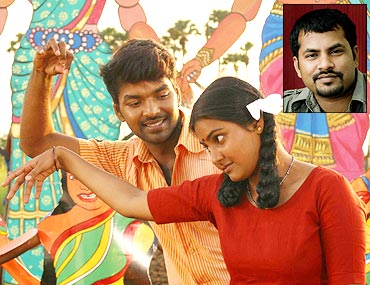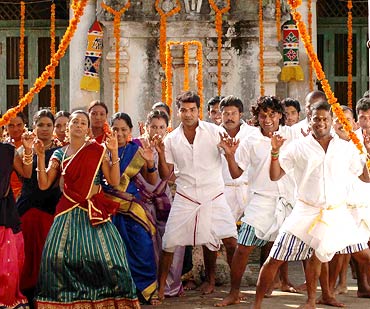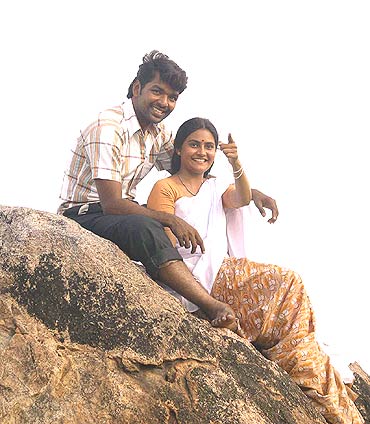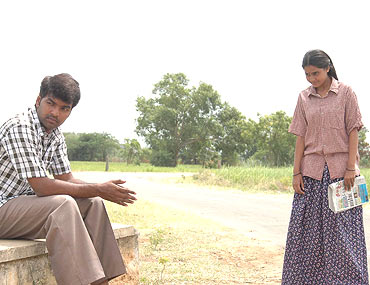
Meera Kathiravan's first film Aval Peyar Tamilarasi -- produced by Moserbaer -- made headlines when it was appreciated at the Dubai Film Festival.
Before the Tamil film releases in theatres this Friday, the 30-year-old director talks to Shobha Warrier about it.
First, let me ask you about your name. 'Meera' is a female name.
Yes, Meera is my mother's name. I have kept her name as my first name. When people call me Meera, I feel her presence. She stays in a small village called Chokampatti in Thenkasi.
Even before the release of your film, Aval Peyar Tamilarasi, it has made waves at the Dubai Film Festival. How was the experience there?
It was a great experience. In the 75-year-old history of Tamil cinema, a Tamil film was screened for the first time at a festival before its theatrical release. I am also a first-time director. We had two shows there and both the shows were houseful. We got a standing ovation after each screening. Many people said that Tamil cinema was not dead. When people said they were reminded of (noted scriptwriter-filmmaker) Lohitadas while watching the film, I was thrilled. I was extremely influenced by him and was an assistant to him.
Does the appreciation at the film festival make you less nervous before the film's release?
Not only because of the appreciation, but I think the film has come out well. Many directors who saw the film also had good opinions about the film.
How did you enter films?
I had no dream of becoming a filmmaker when I was young. After school, I came to Kerala from my village. It was there that I started watching good films -- those of Jayaraj, Lohitadas, Bharatan, Adoor and Aravindan. That was how I became passionate about films, and wanted to become a filmmaker. After two years in Kerala, I came to Chennai and started assisting Thankar Bachan.
Till 2001, I had not read any books.
You have translated the screenplays of Malayalam writers like MT and Padmarajan. What did you find interesting about the screenplays of these filmmakers?
I feel the Kerala audience was mature enough to appreciate the films made by filmmakers like Adoor, Aravindan and MT. That's why Kerala had such esteemed filmmakers. That was not the case here. In the 970s, we had Balu Mahendra, Bharatiraja and K Balachander. After them, there are no such filmmakers.
Now after a long time, the Tamil audience will get to see offbeat and classy films. It is unlikely that we will get to see films like those of Adoor or Aravindan because we have a mixed audience here. It takes time for the audience to mature to understand such films.
Entertainment is still the main concern here, so, it will take time to change. The good feature is that we have sensible producers like Dhananjayan of Moserbaer who want to make quality films. In another five or six years, we may also see such films here. With the kind of exposure youngsters have of world cinema, those films will be appreciated too.

Is Aval Peyar Tamilarasi an offbeat film?
It may look like an offbeat film but it is an entertaining one, with six songs, a comedy track and a fight. I don't think you can call a film with six songs an offbeat film.
Does that mean you had to compromise a lot?
One has to. I am basically a writer and like I said, I have translated the works of great filmmakers of Kerala. So I am familiar with writing and filmmaking.
As a writer, I don't have to think of anyone. The kind of freedom one experiences as a literary personality is not there as a filmmaker. If you are bored with a book, you keep the book aside and go for another one. But in the case of films, you keep people inside an auditorium and tell them a story. It is like telling a story to a group of people inside a jail. One has to make it entertaining for them.
You said after five-six years, the Tamil audience will also appreciate the kind of films made by the likes of Adoor and Aravindan. Do you call this the enlightening of the audience?
Definitely. Even if I am telling stories to jail birds, they have to be understanding of what I tell them. They have to grow up as listeners if they have to understand me.
How can you make the audience appreciate such films? How will the change happen?
I feel a change will happen because the younger generation is exposed to what is happening around the world. Communication is the key. When the audience is enlightened, filmmakers also will change.

But a Ray or an Adoor happened when the Bengal or Kerala audience was not exposed to world cinema. How do you think they could make world class films then and the audience could appreciate them?
The difference between Kerala, Bengal and other states is in the cultural, political and literary development. Communist uprising gave people the freedom to think independently. That showed in their thinking in every aspect of life. Free thinking led to revolution in Kerala and Bengal. And it got reflected in literature and films.
Coming back to your film, what is the inspiration behind Aval Peyar Tamilarasi?
It is a love story and the story is told from the hero's point of view. From the title, you may think otherwise. He is Jothimurugan who grows up in the company of his grandfather in a village that does not have many literate people. He develops a relationship with a girl, who comes to his village and one particular moment, he loses her. So he goes in search of her.
Were you inspired by any person or incident, or is it purely a creative work?
All creative outputs have inspiration from real life. Nothing comes from thin air. Life is what is behind all inspiration. I am very, very inspired by folklores and folk arts which are thousands of years old.
On the other hand, cinema has its origin only about 100 years ago. Because cinema is such a powerful medium, it destroyed an art that is 1,000 years old. I have been thinking about this for a long time. When cinema was not there, these folk arts entertained people.
In Malayalam, you had National Award winning films like (Shaji N Karun's) Vaanaprastham or (Jayaraj's) Kaliayattam where such folk arts were the mainstay of the films. But here, we have not made any such films. It is this thought that is behind the film.
Is your protagonist a folk artist?
Jothimurugan is from a family that has centuries old connection with the ancient culture of Tamil Nadu.

What folk art are you showing in the film?
That is a secret. But Dussera that is celebrated in Tiruchendur is featured prominently in the film. You will come to know about the Tamil culture and the lifestyle of the people of that region. The film depicts two-three folk arts of the region. This is the first time that a Tamil film is giving this much importance to a folk art.
Did you think of having a big star as the protagonist?
When you make a realistic film, you can't have established stars. You are expected to make a lot of changes for them. I can't have such changes in this film.
I chose Jai because we depict three stages in the life of the protagonist. He has to be a high school student, a 22 year old and then a 28 year old. I needed a person who could do all these parts convincingly. I signed Jai when he was working for Subramaniapuram. He looked around 28 in that film while he looked like a high school student in Chennai 28. That gave me the confidence that he could be moulded for my character.
Why did you decide to debut with such an unconventional film?
I have worked with some great filmmakers. So I wanted my first film to be a good one. I want the first impression to be a good one. It was the result of toiling for 12 years. So I was very particular that I did this as my first film. When I narrated the script to Balu Mahendra, he liked it. I wanted to show this to Mani Ratnam, as his Madras Talkies was producing good films. I made a trailer to impress him but could never show it to him. I sent the trailer and script to Dhananjayan sir and he was impressed, and Moserbaer decided to produce it.
Which filmmakers have influenced you?
Balu Mahendra for poetically telling stories, Lohitadas for the way he handles emotions and Thankar Bachan for the way he creates his characters who look and behave like ordinary Tamilians.